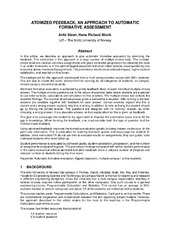Atomized feedback, an approach to automatic formative assessment
Sammendrag
In this article, we describe an approach to give automatic formative evaluation by atomizing the
feedback. The mechanics in this approach is a large number of multiple-choice tests. The multiplechoice tests are used as voluntary assignments and gives controlled progression by releasing the
tests in an order. Instruction is in the spirit of flipped classroom with short video lectures accompanied
by one to several above-mentioned assignments. The preliminary results show reduced dropout,
higher student satisfaction, and less fail on final exam.
The background for this approach submerged from a multi-campus/online course with 300+ students.
The aim was to create the same environment for learning for all categories of students, on campus,
remote campus and online students.
Atomized formative evaluation is achieved by giving feedback down to each individual multiple-choice
answer. The multiple-choice questions are in the nature of practical tasks where students are
expected to use external tools, calculations and simulation to find answers. The multiple-choice test
collects the students’ findings. The number of correct answer gives a summative evaluation. After
turning in the test, answers are available together with feedback for each answer. Correct answers
explain why this is correct and a wrong answer explains why this is wrong in addition to how and why
the student should go by finding the correct answer. The questions are designed with no “dummy”
answer, so when choosing a wrong answer, it is a plausible answer, and an explanation for this is
given as feedback.
The goal is to encourage the student to try again both to improve the summative score and to fill the
gap in knowledge. When forming the feedback, one must consider both the type of question and the
choices made available.
Using atomized feedback improves the formative evaluation greatly by being instant, continuous, to
the point and informative. This is evaluation for learning that both guides and encourage the student.
In addition, since instructors/TA do not use time to evaluate results on assignments, they can guide /
tutor individual students who need follow up.
Student performance is evaluated by achieved grade, student satisfaction, progression, and the
number of assignments compared to grade. The preliminary findings compared with earlier student
performance in the same course but without atomized formative feedback show a reduced number of
dropouts and reduced number of students failing the final exam.
Beskrivelse
Accepted manuscript version, published version available at:http://dx.doi.org/10.21125/iceri.2017.1368


 English
English norsk
norsk